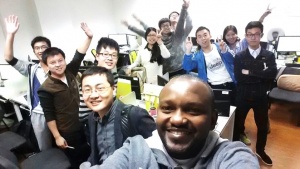Difference between revisions of "Main Page"
| Line 35: | Line 35: | ||
=== People === | === People === | ||
Mobinets is led by Dr. [http://zhiweizhao.com Zhiwei Zhao]. | Mobinets is led by Dr. [http://zhiweizhao.com Zhiwei Zhao]. | ||
Our students also receive supervision from the following professors and researchers: | |||
* Prof. [https://people.exeter.ac.uk/gm321/ Geyong Min], University of Exeter, UK | * Prof. [https://people.exeter.ac.uk/gm321/ Geyong Min], University of Exeter, UK | ||
* Prof. [https://emps.exeter.ac.uk/computer-science/staff/kl406 Ke Li], University of Exeter, UK | * Prof. [https://emps.exeter.ac.uk/computer-science/staff/kl406 Ke Li], University of Exeter, UK | ||
Revision as of 16:57, 28 August 2019
MobiNetS is a research group targeting at the cutting-edge topics in the area of mobile, networked and smart computing, including low power wireless and sensor networks (LPWSN), mobile edge computing (MEC), network function virtualization (NFV), wireless sensing, etc. Our group locates in UESTC@China. 团队招生信息在这里。
Research interests
The research interests are driven by the emergence of more and more pervasively deployed Internet-of-Things systems and the 5G mobile computing, which includes low-power wireless computing, edge computing for IoT and mobile/wearable computing.
Low-power wireless
Low-power wireless computing is an important enabling technology for Internet-of-Things (IoT). In low-power wireless, our research work mainly focuses on ZigBee-based ad hoc networks and LoRa-based long-range low-power wireless networks. Specific topics include network deployment, performance modeling, routing protocols, network coding, resource allocation, etc.
Edge computing for IoT
As IoT systems are more pervasively deployed, massive computation and communication demands emerge from the numerous IoT devices. Edge computing is key to addressing the demands, providing additional computation and communication resources in the proximity of front end users. We focus on SDN/NFV enabled edge computing. Specific topics include resource allocation, network function virtualization (NFV), service chaining, service placement, deployment, etc.
Mobile/wearables computing
With the aid of edge computing and low-power embedded computing, it becomes possible to transplant complex machine learning algorithms to the mobile and wearable devices. As a result, mobile/wearable computing becomes a hot and promising topic. In mobile/wearable computing, our research work mainly focuses on data-driven applications on human-machine interaction, cyber-physical interfaces, etc.
People
Mobinets is led by Dr. Zhiwei Zhao. Our students also receive supervision from the following professors and researchers:
- Prof. Geyong Min, University of Exeter, UK
- Prof. Ke Li, University of Exeter, UK
- Prof. Zheng Chang, University of Jyväskylä, Jyväskylä, Finland
Some of our students are co-supervised by the above professors in the area of network big data, network function virtualization, and resource optimization.
招生
实验室持续招收有志于物联网、5G边缘计算领域前沿研究的博士和硕士研究生。 实验室招生工作详情在这里。

